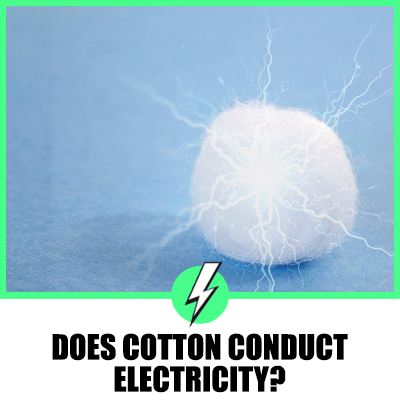Does Cotton Conduct Electricity? A Comprehensive Analysis for the UK and US Audiences
Cotton, a natural fiber, has been a cornerstone of human civilization for millennia.
From the iconic cotton mills of Manchester to the vast cotton fields of Texas, its presence is undeniable.
But beyond its use in textiles, does cotton have a role in the realm of electricity?
Let’s explore.

Contents
Is Cotton a Good Conductor of Electricity?
Cotton, in its natural dry state, is not a good conductor of electricity.
The reason?
The absence of free electrons in cotton.
For a material to conduct electricity, it requires free electrons that can move and carry the electric charge.
Cotton lacks these free electrons, making it an insulator.
For the tech-savvy in Silicon Valley or the engineers in Birmingham, understanding the conductivity of materials like cotton is crucial for various applications, from electronics to safety gear.
Is Cotton an Electric Conductor or Insulator?
Cotton is an electric insulator.
The fibers of cotton trap many air molecules due to their loose intertwined nature.
Air, being a poor conductor of both heat and electricity, combined with the cotton fibers, makes cotton an effective insulator.
This property is especially important in the textile industry, where cotton’s insulating properties are harnessed for clothing suitable for both the cold winters of New York and the rainy days of London.
Is Cloth a Good Conductor or Bad Conductor of Electricity?
Cloth, especially when made from cotton, is not a good conductor of electricity.
It acts as an insulator.
However, it’s essential to note that if the cloth becomes wet, its insulating properties can diminish, and it may start conducting electricity.
This is because water is a better conductor than air.
This property has implications in safety standards, especially in industries where workers might be exposed to electrical equipment.
Is Cotton an Insulator?
Yes, cotton is an insulator.
Both the cotton fibers and the air trapped between them have very low values of thermal conductivity.
This makes cotton effective in resisting the flow of heat, making it a good heat insulator.
This property is why cotton clothing is popular in both the chilly climates of Scotland and the desert heat of Arizona.
Does Electricity Pass Through Cotton?
Electricity does not readily pass through dry cotton.
However, when cotton becomes wet, it can conduct electricity.
This is because the pockets within the cotton that were previously filled with insulating air molecules get replaced by water molecules, which can conduct electricity.
This property is crucial for safety regulations, especially in professions where there’s a risk of electrical exposure.
Cotton’s Electrical Properties
| Property | Description |
|---|---|
| Nature | Insulator |
| Electrical Conductivity | Very low |
| Thermal Conductivity | Low |
| Behavior when Wet | Can conduct electricity |
| Comparison with Other Materials | Similar insulating properties to wood and rubber |
Insights from Online Discussions:
PostHope’s Perspective on Cotton’s Conductivity
Cotton is a poor conductor of both heat and electricity due to the air molecules trapped between its fibers.
Byjus’s Take on Cotton as an Insulator
Cotton is a good electric insulator because it lacks free electrons, which are essential for conducting electricity.
Quora Users Discuss Cotton’s Insulating Properties
A user shared a personal experience, highlighting that cotton acts as an insulator, but its weave allows spaces between threads, making it no better than air in terms of insulation.
LambdaGeeks’ Comprehensive Overview
Cotton acts as an insulator when dry but can conduct electricity when wet due to the presence of water molecules.
For the UK and US Audience: A Note
Whether you’re in the heart of London, amidst the bustling streets of New York, or anywhere in between, the relevance of materials like cotton transcends borders.
Its insulating properties, though not unparalleled, are significant.
As technology continues to evolve on both sides of the Atlantic, the age-old cotton still finds its place, testament to its enduring properties and versatility.
In wrapping up, cotton’s ability to resist the flow of electricity, while not unparalleled, is substantial.
Its blend of comfort, safety, and insulating properties ensures its continued relevance in both historical textiles and modern applications.
Whether in the UK or the US, cotton remains a material of choice for myriad purposes.





